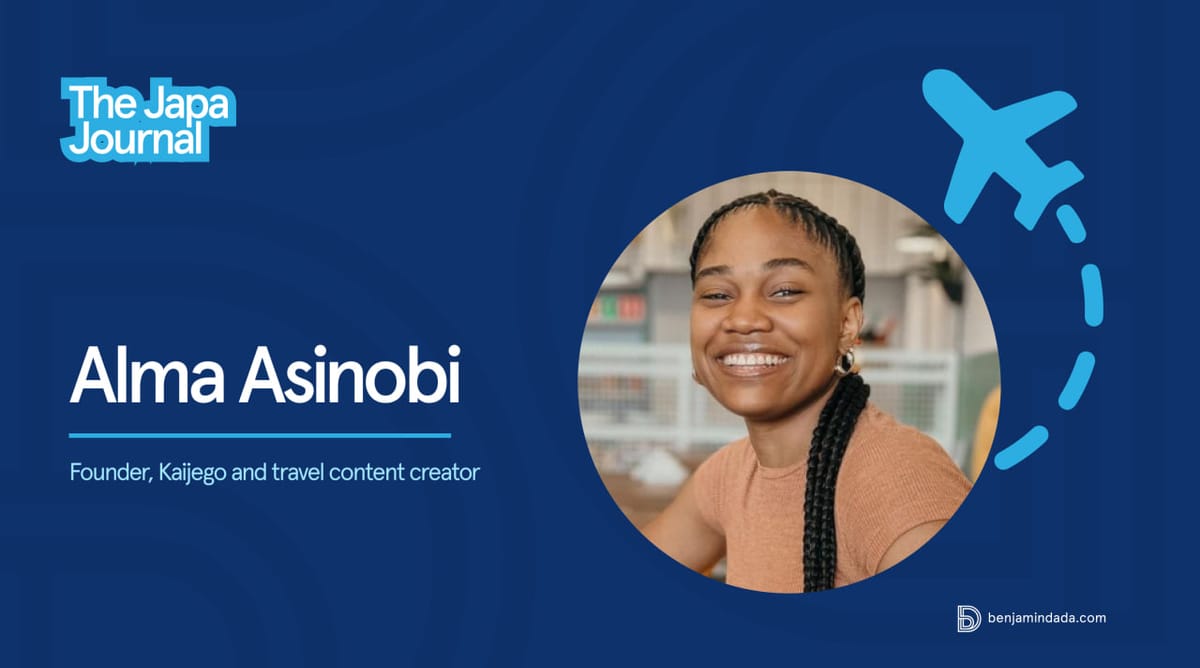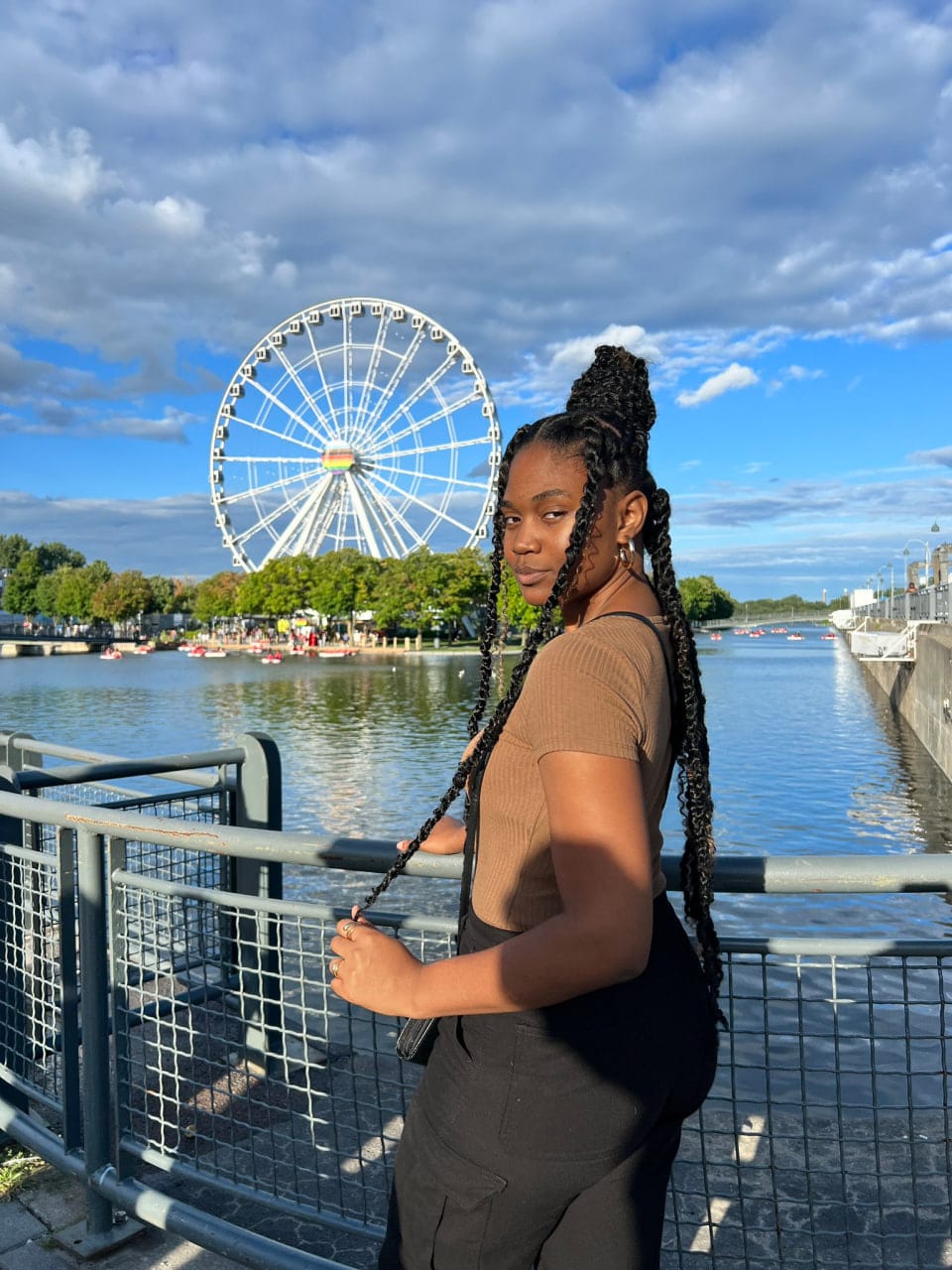Inside Alma Asinobi’s plan to get Africans to travel the world via Kaijego
Alma Asinobi talks about her travel motivation, experiences, Kaijego and why people should travel more.

The Japa Journals is a new web series that dives deep into the journey of African tech professionals outside the continent and sheds light on their trials, triumphs, challenges and victories. These will guide potential immigrants and enable them to avoid landmines, quagmires and optimise their journeys in a foreign land.
For most Nigerians, travelling is a luxury reserved only for the rich. However, after her first trip outside the country, Alma Asinobi decided that she wanted to see more of the world. So she committed to embark on the epic journey of visiting every country of the world. As of the time of publishing this article, she has been to 18 countries across four continents.
Peradventure, you are just reading about her for the first time, Asinobi is a travel content creator and content strategist who works at the intersection of storytelling, and content marketing for tech startups like Cowrywise and Lazerpay. She's also the founder of Kaijego - a travel company that focuses on decolonising travel by helping weak passport holders reach their travel goals and see more of the world. She studied Architecture in her undergraduate and master’s programmes.
First trip outside Nigeria
Asinobi’s first trip outside Nigeria was a weekend road trip from Lagos to Cotonou in the Benin Republic, with two of her friends. After they left the Nigerian borders, it didn’t take long for her to notice the stark difference in both countries.
“The first difference I noticed was in the roads. We moved from the poor Badagry roads on the Nigerian side of the border into a perfectly smooth road in Cotonou. The lanes for cars, buses and even bikes were well-marked out.”
She also observed that the beaches were different, “anyone could just waltz into the beach without being stopped by security guards or gatekeepers who demand entrance fees. People didn’t pay to go to the beach. That was new for me,” Asinobi explained.
Another difference Asinobi saw was in the buildings and the way the people dressed: "The Beninese were colonised by the French. So you could still see the colonial influence in their architecture, in their language, food and so many other things."
What surprised Asinobi was that despite the proximity of both countries, the diversity that I got to see, or I got to notice, was striking.
Since it was a weekend trip with two of her friends, they spent time exploring the market, which was the largest open-air market in West Africa. They also saw the Notre Dame de Miséricorde, commonly known as Cotonou Cathedral.
However, beyond the surprise and thrill, that first trip outside Nigeria struck a chord which made her make a momentous decision. "It was on that trip I decided," Asinobi said, "that I'm doing this for the rest of my life. I want to see more of the world. I want to see more different cultures. I want to see more similarities. I want to experience more than my background has offered me." As of the time of publishing this article, she has been to 20 different countries.

Why people should travel more
According to Saint Augustine, a theologian and philosopher, "The world is a book, and those who do not travel read only one page." This implies that there’s a certain richness of life which can only be appreciated through travel. Asinobi echoes this line of thought and believes that people should travel more because it expands the mind. “I always think about it like a book with 197 chapters. If you’ve never travelled outside your country before, it’s like being stuck in one chapter. You haven’t flipped the page and don’t know what is happening anywhere else,” she said.
There are so many perspectives and cultures out there which can only be unravelled by travelling. For instance, in certain cultures, you don’t walk into people’s houses with your shoes on. When you do, that is very disrespectful. In another culture, chewing gum is offensive.
In a particular country in Asia, Alma said, if you visit a family, and they offer you food, and you finish your meal it sends a particular message. Inadvertently, you’re saying that the person who gave you food didn't have enough to give you, so you had to clear the plate. You probably wanted more stuff. In another part of Asia, if you don't finish your meal, then it's disrespectful. It means you didn't like the food or something like that.
Another reason Asinobi, believes youths should travel more is for context. “It’s been said that the youth are the leaders of tomorrow. But we don't have enough context as to how things should work, and how things should function. If we don't go and see those things for ourselves, we won’t be able to effect the changes we desire.
If you've never experienced a bus that is self-driven, or that is controlled from a central place or picks people up and drops off at the exact time it says it would, you would think it's impossible.
Another instance is if you live in a village where the biggest form of transportation for chiefs and kings is a chariot, you will never think of the fact that there is something like a car, talk less of an aeroplane.
"But most people never dream because they don’t know that there’s a possibility. The things that you're not exposed to, you can't fathom. When people make wishes, they wish for what they know is possible."
Travelling helps people to wish and dream more. When you travel, you expose yourself to that. And it expands your mind.

Making Canada her second base
The Nigerian passport is not the strongest in terms of granting access to a lot of countries. Holders of the Nigerian passport can only visit 46 countries out of 227 without needing a visa.
So most ambitious Nigerians who are looking to compete globally seek out a second passport. Getting a second powerful passport affords Nigeria’s passport holders more visa-free access.
Related post: UK passport, a better pair for Nigerians than US & Canada, Henley Passport Index reveals
This was a major determinant for Asinobi when she wanted to decide the country to get a second passport. As a regular travel content creator, it was important for her to move between countries without hassle.
She chose Canada because it was in North America, which is quite distant from Africa. “Because I want to visit every country,” she said, “I wanted a base in the Americas to explore North and South American countries because exploring this side of the world from Africa is a Herculean task.”
Flights and prices were another major determinant. “I can easily book a flight from Canada to see Puerto Rico for $200 to and fro, or $180. But from Nigeria, or even Ghana or Kenya booking a flight to Puerto Rico would be much more expensive. It will cost me somewhere between $2400 and $2,500, excluding visa costs and fees.
Another reason for choosing Canada was that it offered a shorter path to citizenship. Canada requires applicants to be physically present in the country for at least 1,095 days (3 years) after permanent residence to qualify to apply for citizenship. Meanwhile, the UK requires 5 years before you can apply, while you can only apply in the USA five years after obtaining permanent residence.
The last reason was to give her future family the option that a more powerful passport offers. Canadian citizens can travel visa-free to 148 countries. Being a regular traveller, Asinobi experienced first-hand the limitations of the Nigerian passport. “I want to give them options, give them a choice that I didn't have. That was mostly what I considered when I chose to set up the second base in Canada,” she said.
Quick tips to settle in Canada
For Africans who recently moved to Canada, Asinobi suggested the following tips:
Credit is the backbone of the economy. So the first thing you should do is to get a credit card so you can start building a credit history.
If you are going to need a job in Canada, start applying before you arrive. You can change your location on LinkedIn if you are certain of the place you'll be staying.

Related post: Seven things to do before relocating to Canada
About Kaijego
Asinobi’s travel goal has grown beyond her and led her to start a travel company, Kaijego, which helps people with weak passports travel more and travel easier. Kaijego, means “Let's Go!” in Igbo, and through the platform Asinobi is taking young Africans on colourful, unforgettable adventures worldwide. So far, Kaijego has organised group and private trips to seven countries.
Speaking on her growth plans with Kaijego, she said, “We’re looking to close the information gap that exists in the travel industry, especially for people who don’t have passport privilege. In 2 years, Kaijego will be the go-to website for anyone looking for detailed information about their upcoming trip - especially regarding visas and budgets.”
Experiencing travel shocks
Speaking on her weirdest travel shocks, Asinobi narrated, “I went grocery shopping one time in Kenya, paid at the counter and was leaving the store. As I headed towards the exit, I saw the security at the gate. You know how in Nigeria when you're leaving the supermarket, you show your receipt and open the bag for security to see.
As I was heading towards the man, I stuck out my receipt and opened my bag because I was in a hurry. But I was surprised because he was walking back and looking terrified. I kept insisting that he take my bag, but he kept refusing while moving back.
I'm like, what's happening here? But it suddenly struck me. I realised that it was mostly a Nigerian thing. That thing where you leave a store, and you show them receipts. I left that place feeling embarrassed because I felt I upset the man.
Another time, I went to a convenience store in the Benin Republic. That was my first time outside the country. I didn't know that they didn't give nylons like they do back home. They don't just hand out nylon bags at the counter. If you need one, you’d have to buy a shopping bag, or you carry everything you bought on your head. After shopping, I had to carry everything that I had in my hand.
Related post: Eight global digital nomad visas Africans can explore
This is the first of The Japa Journal's Series. If you're an African tech professional in the diaspora who would like to be featured or want to recommend anyone who will be a good fit, kindly fill out this form.
You can become one of our partners by taking up a sponsorship package. For more information, email hello@benjamindada.com.






